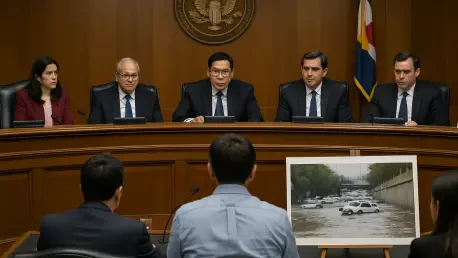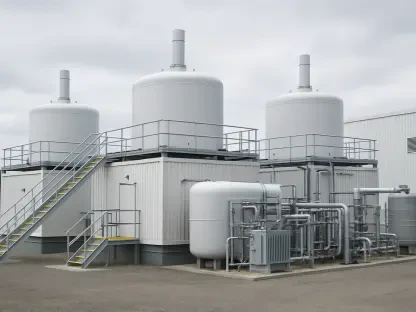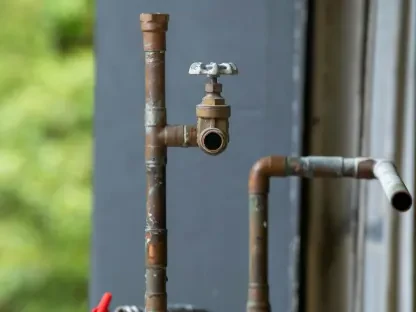In a striking display of authority, the Philippine Senate has issued a stern ultimatum to contractors linked to flood control projects, warning that failure to attend investigative hearings could result in arrest. This decisive action, spearheaded by the Senate Blue Ribbon Committee, emerges amid mounting concerns over alleged fraud, substandard workmanship, and entrenched corruption in public infrastructure initiatives, with a particular focus on Bulacan province. Despite the government pouring a staggering P1.9 trillion into flood mitigation efforts over the past decade, persistent flooding continues to devastate communities, fueling public outrage and prompting urgent questions about where the money has gone. The Senate’s probe aims to hold accountable those responsible for potential mismanagement, targeting contractors who may have profited from incomplete or fictitious projects. Senate President Francis Escudero has made it clear that ignoring subpoenas for the upcoming hearing on September 1 will carry severe consequences, signaling a no-nonsense approach to uncovering the truth. This investigation transcends mere blame, seeking to restore faith in how taxpayer funds are utilized for critical national issues. The spotlight on eight specific contractors, tied to various firms, underscores their pivotal role as witnesses who could expose broader complicity among public works officials and lawmakers. Their absence from initial hearings has only intensified the Senate’s determination to enforce compliance, highlighting the gravity of a crisis that affects millions across the country.
Unyielding Demand for Contractor Accountability
The Senate, under the leadership of President Francis Escudero, is taking an uncompromising stance against contractors who evade scrutiny, emphasizing that accountability is paramount in addressing the flood control debacle. The Blue Ribbon Committee has explicitly threatened arrest for eight named contractors who failed to appear at the initial hearing, sending a resounding message that non-compliance will not be tolerated. These contractors are considered crucial to the investigation, as their testimonies could unravel a web of potential corruption involving government officials and possibly even legislators. The push for their attendance is not merely a procedural formality but a strategic move to piece together how billions in public funds may have been mishandled. This firm approach reflects a broader commitment to ensuring that private entities entrusted with public projects face consequences for any lapses or deliberate wrongdoing. The Senate’s resolve to enforce subpoenas under penalty of law highlights the urgency of tackling a national issue that has left communities grappling with recurring floods despite massive investments.
Moreover, this aggressive pursuit goes beyond legal repercussions, aiming to set a precedent for future public works contracts. The focus on these contractors as key witnesses suggests a deeper intent to expose systemic failures that have allowed substandard or non-existent projects to persist unchecked. By compelling their participation, the Senate hopes to gain critical insights into whether payments were made for work that was never completed, and if so, who else might be implicated in such schemes. This step is seen as essential to rebuilding public trust, as Filipinos grow increasingly frustrated with the apparent disconnect between government spending and tangible results. The outcome of this hearing could shape how accountability is enforced in infrastructure projects moving forward, potentially deterring future irregularities through the threat of serious consequences.
Exposing Fraud in Flood Mitigation Efforts
Allegations of widespread fraud have cast a dark shadow over flood control initiatives, with evidence suggesting that some contractors may have exploited the system for personal gain. Reports of faked geotagged photos submitted to justify payments for incomplete or entirely fictitious projects have surfaced, pointing to a blatant misuse of accountability measures. Senator Mark Villar, who once served as Public Works Secretary, expressed dismay over how geotagging—a tool introduced to ensure transparency—has been manipulated, revealing significant gaps in oversight that allow such deception to thrive. This betrayal not only undermines the integrity of public works but also exacerbates the suffering of communities repeatedly hit by floods, despite the allocation of vast resources. The scale of potential mismanagement, with P1.9 trillion spent over years with little improvement, has turned public frustration into a demand for answers and justice.
Equally concerning is the concentration of funding in specific regions like Bulacan, which received P44 billion out of a larger regional allocation, making it a focal point for uncovering whether these funds were misused. The persistence of flooding in areas supposedly benefiting from these projects raises troubling questions about whether the reported infrastructure even exists. Investigations into these discrepancies aim to pinpoint where the breakdowns occurred—whether through deliberate fraud or gross negligence—and who ultimately profited at the expense of public safety. Such revelations paint a grim picture of systemic issues that go beyond isolated incidents, suggesting a pattern of exploitation that has hindered effective flood mitigation. Addressing this fraud is not just about punishing the guilty but about ensuring that future projects deliver real results for vulnerable populations.
Audit Efforts to Verify Project Integrity
The Commission on Audit (COA), under Chairperson Gamaliel Cordoba, has stepped into the fray with a comprehensive fraud audit and technical inspections targeting flood control projects, beginning with Bulacan. Prompted by a directive from President Ferdinand Marcos Jr., the COA is meticulously examining contracts valued at P548 billion awarded in recent years, with the goal of confirming the physical existence and quality of reported infrastructure. This hands-on approach is vital for providing concrete evidence in a probe dominated by allegations and speculation, ensuring that findings are rooted in verifiable data. Bulacan’s substantial share of funding makes it a critical starting point, as the outcomes of these audits could reveal the extent of mismanagement in one of the most heavily invested regions. The COA’s work is a direct response to public outcry over resources seemingly vanishing without delivering promised flood relief.
To achieve its objectives, the COA is employing rigorous methods, including geotagged photos and video documentation, to detect ghost projects and assess compliance with engineering standards. This detailed scrutiny of high-value contracts aims to expose any instances of substandard construction that may have contributed to ongoing flooding issues. The significance of these inspections extends beyond immediate findings, potentially setting a benchmark for how future public works are monitored and evaluated across the nation. If successful, the audit could lead to stricter guidelines and enhanced oversight mechanisms to prevent similar discrepancies in other regions. Public confidence in government spending hinges on the COA’s ability to uncover the truth and ensure that taxpayer money translates into tangible benefits, rather than disappearing into a void of corruption or incompetence.
Systemic Barriers and Political Meddling
Beyond the actions of contractors, the flood control crisis is compounded by deeper systemic issues, with political interference emerging as a significant barrier to progress. Senator Imee Marcos has publicly criticized certain lawmakers for allegedly manipulating budgets, redirecting funds to personal projects through unprogrammed appropriations, which disrupts the implementation of effective flood mitigation strategies. This accusation points to a troubling reality where public welfare may be sacrificed for individual gain, perpetuating a cycle of inefficiency that leaves communities exposed to natural disasters. The notion that political agendas could override the urgent need for functional infrastructure adds a layer of complexity to the investigation, suggesting that accountability must extend to those in power who enable or benefit from such irregularities.
Compounding this problem is the glaring absence of a comprehensive flood control master plan, a gap that has drawn sharp rebuke from senators questioning the Department of Public Works and Highways (DPWH). Reports indicate that current DPWH leadership lacks awareness of any cohesive strategy passed down from previous administrations, raising serious concerns about the continuity and vision behind flood mitigation efforts. Without a unified plan, projects risk being fragmented and ineffective, failing to address the root causes of flooding that plague the nation year after year. This planning deficiency, combined with political meddling, creates a formidable obstacle to sustainable solutions, leaving affected regions in a perpetual state of vulnerability. Tackling these systemic issues is essential to ensure that future investments yield meaningful outcomes rather than repeating past failures.
Path Forward for Transparency and Reform
Looking back, the Senate’s resolute push to hold contractors accountable through the threat of arrest marked a pivotal moment in the fight against corruption in flood control projects. The Blue Ribbon Committee’s actions, coupled with the COA’s detailed audits in Bulacan, laid a foundation for exposing fraud and ensuring that public funds were scrutinized with unprecedented rigor. Allegations of faked documentation and political interference brought to light by senators painted a stark picture of systemic rot that had long hindered effective flood mitigation, despite the staggering P1.9 trillion spent over the years.
Moving ahead, the focus must shift to implementing robust oversight mechanisms to prevent future mismanagement, such as mandatory real-time tracking of project progress and stricter vetting of contractors. Establishing a long-overdue national flood control master plan should be prioritized to provide a clear roadmap for sustainable infrastructure development. Additionally, legislative reforms to curb political interference in budget allocations could safeguard public resources from misuse. Encouraging citizen reporting of irregularities through protected channels might further strengthen accountability, ensuring that the momentum from this probe translates into lasting change for flood-prone communities across the nation.









